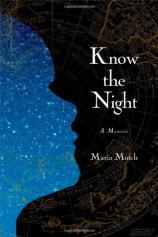Know the Night: A Memoir of Survival in the Small Hours
Review
Know the Night: A Memoir of Survival in the Small Hours
In this poetic plaint of nocturnal loneliness, Canadian American Maria Mutch has intertwined the stories of two survivals --- hers, night after night, listening for sounds from her autistic son, Gabriel, who rarely slept for several years, and that of Admiral Richard Byrd, who chose to stay alone in a snow-capped hut during a Polar winter.
Gabriel was born with Down Syndrome, a puzzle in itself but a bearable diagnosis. It gradually became apparent, however, that the child had other problems. He began to speak and then stopped completely. Then the shrieking began, much of it unaccountably in the middle of the night: “I’m not sure how we survived it.” Yet for Gabriel, it seemed an expression not of terror but of some unknowable comfort. The diagnosis of autism came almost as a relief to Mutch and her husband, since there was at least a medicine that reduced the screaming, though the long-term prognosis then seemed far less bright.
"Written with an almost old-fashioned love of classical language, about love and wonder, despair and darkness, [Mutch's] book carries us through to morning and 'the approach of light, which will find us different from the day before.'"
At one point, contemplating her sleeping son, Mutch enumerates the specialists he has required in just the few short years of his life: "pediatrician, pediatric dentist, neurologist, speech therapist, occupational therapist, pediatric opthalmologist, physical therapist, developmental therapist, gastroenterologist, and psychiatrist." Lists are one of the features of Mutch’s meditations in this emotive account, divided into the hours of the night from midnight to dawn. Byrd, convinced that having the right things would guarantee his success in winter survival, made many lists, and often became convinced he had brought the wrong things, since the results --- physical illness and borderline madness --- were not what he had anticipated. Mutch compares this to the hopes of a parent, especially that of a disabled child: there must be some thing that will make the situation better.
“Before Gabriel,” Mutch recalls, “I believed that night is for forgetting in the morning." Determined to remember and record, the author has a poet’s ear; the house is cold at night, she says, "somewhat porous, like an old bone." She describes the tough times with Gabriel: "If you want to be with him... you must be willing to be with the repetitions" --- and the good signs also. Gabriel, like Byrd marooned in ice with only Morse code for communication to a distant outside world, has pictures and symbols with which he communicates. He loves jazz: “it gives him quiescence.” And once he accustoms himself to the sensory chaos of school, it seems his classmates love him in small ways, expressed in notes he brings home, making his mother wish she could understand what it is like to be Gabriel.
Mutch, we feel, has more to say and will keep us informed about her son as his life progresses. Written with an almost old-fashioned love of classical language, about love and wonder, despair and darkness, her book carries us through to morning and "the approach of light, which will find us different from the day before."
Reviewed by Barbara Bamberger Scott on April 20, 2014
Know the Night: A Memoir of Survival in the Small Hours
- Publication Date: March 25, 2014
- Genres: Nonfiction
- Hardcover: 224 pages
- Publisher: Simon & Schuster
- ISBN-10: 1476702748
- ISBN-13: 9781476702742





